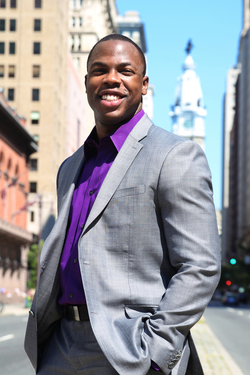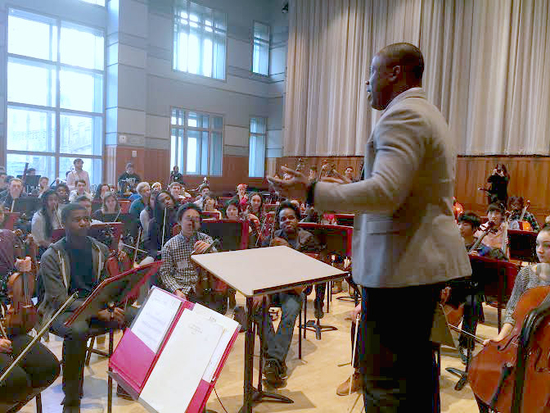Preparing a generation of civic-minded, socially conscious musicians to be leaders both on and off the stage

Photo credit: Carolyn Stanish
There is no combination of words that aptly describes my love of music. I love music so much, in fact, that I earnestly believe all children should have access to music in their lives–not just because of its beauty, but because of its ability to transform lives, to save lives. As a lifelong ambassador for music, I feel it’s my duty to spread this message to as many people as possible, whenever possible, wherever possible.
And that philosophy is the foundation for my nonprofit organization: Project 440.
Project 440 was created in Savannah, GA, almost ten years ago, as a response to the closing of the doors of the former Savannah Symphony Orchestra. Through their teaching, members of that orchestra had created a vibrant community of young musicians–many of whom have pursued music professionally or been life-long supporters. Our aim as an organization was to fill a music-educational void left by the absence of the orchestra. Within a year, the Project 440 team found itself playing in every community center and library within Chatham County. Our shows were immediately successful, and the kids we worked with left our programs with an earnest desire to learn more about classical music. It was thrilling!
As the founding members of Project 440 grew older, we had a hard time finding musicians among our peers who had the skills needed to do our work in Savannah. Despite their superb educations, they weren’t prepared to lead masterclasses, excite young people, and speak to different audiences about the art form in a way that was fun and engaging. Frankly, most of our colleagues at the time were more concerned about a fingering in a difficult excerpt, or preparing for an upcoming competition or audition. We decided that this was a problem that not only needed to be addressed, but ultimately solved.
In 2010, Project 440 shifted its focus from an organization that solely provided community engagement opportunities to one that taught other young musicians how to share their art with the world around them. We emphasized the importance of service through music as well as provided the skills to show just how fun and easy it was to put together engaging and interactive presentations. Our programs proved young people did not have to wait until “Carnegie Hall” to share their talents as musicians. Instead, there were children in community centers, seniors in retirement communities, and patients at local hospitals who would all love the chance to experience and learn about our music.
Now headquartered in Philadelphia, Project 440 gears its programs towards high school and college musicians, focusing on three main components as highlighted in our Project 440 handbook, “A Musician’s Guide to Social Entrepreneurship”:
- College and Career Preparedness: What does it mean to be a musician in the 21st Century? What skills will my college/conservatory provide me so that I’m a savvy artist, proficient in my art and competitive in the work force? Who am I as an artist, and how can I use music to reach the goals I have as an individual? There are many career choices a young musician can make in 2015, many of which do not have to take place in a concert hall!
- Entrepreneurship and Leadership Building: We get our students to think outside the box, entrepreneurially and creatively. How can I use my nonmusical skills to further my career? How can I use music as a mechanism–a tool–for service in education, in the medical industry, or in community building? We also provide resume building, networking, and self-promotion guidance.
- Community Engagement and Interactive Performance: We teach the “how-tos” of creating musical presentations for various types of audiences that are relatable and most importantly, interactive! Then we charge our students with putting on these performances in their own communities.
What better way to teach leadership and self-esteem to young musicians than by having them go forth, instrument in hand, serving not only as ambassadors for music but as role models for their peers and future generations of music lovers? The skills learned are ones that can serve them for the rest of their lives whether they become professional musicians or not.
But isn’t just playing or presenting concerts enough? The music alone will certainly speak to our audiences, right?
Unfortunately, due to a lack of engagement in our communities from the classical music industry, convincing the masses that what we do is simply “good for the soul” can be a pretty hard sell. When people are trying to feed their families, pay their mortgages, and hold on to their jobs, what exactly can Beethoven and Brahms do for them? And honestly, audiences have every right to ask such pointed questions. Project 440 takes a holistic approach in addressing their concerns.
In addition to fine-tuning our craft to create the best art possible, Project 440’s philosophy is to use music as a tool in society to make the world a better place. We actively reach beyond the hallowed walls of the concert hall and aggressively infiltrate the communities that surround them. We teach that music can be used as an educational tool, as a tool for civic engagement and social change.
Then things really start to get interesting.
Think about it: what if people depended on music in their communities because it was an avenue by which young people could succeed? Given what we know about how music can help with early cognitive skills, teambuilding, discipline, patience, and a host of positive attributes, who could disagree? What if we actively used music to start conversations between those of different cultures, different backgrounds, different religions and beliefs? These conversations could be about our relationships as citizens of the earth as well as our collective experiences. Take this approach, and to the average man or woman on the street, Beethoven and Brahms just got a lot more interesting.
That is the message of Project 440. We want to harness the energy and enthusiasm of the thousands of students who receive degrees in music every year. Given the right engagement training, an entire work force is ready to take on the problems of the nation. Our strategy: rather than telling young optimistic students to quit music because they’ll “never get a job,” we emphasize the myriad of ways young musicians can engage countless communities across America and make a living while doing it. What does a 21st century performing artist look like? One part performer, one part educator, and one part social entrepreneur. Based on our own personal skill sets, the ratio for each individual will be different. However, as a collective body, our approach of including the community in both our creative process and output strengthens our art form and its value to society. People will see it, people will experience it, and communities will reap the benefits of it.
Current partners of Project 440 include the Curtis Institute of Music, where Project 440 was instrumental in helping to create the Community Artist Program, now one of the flagship programs at the school. Bourgeoning partnerships exist with other local organizations, including the Philadelphia Orchestra. We have a wonderful new relationship with the New York State Summer School of the Arts School of Orchestral Studies, where our curriculum has been imbedded into the merit-based program, and we are starting a pilot program, the Project 440 Initiative, at a Boys and Girls Club in Greensboro, NC.
Our newest and largest partner is the School District of Philadelphia’s All City Program. The students are the top-performing students of the entire district–a district that for many years has been the victim of catastrophic budget cuts. In a district where the counselor/student ratio is 1:560, Project 440 will provide much needed college and career guidance to the students of this historic program.

The author working with Philadelphia’s All City program
Photo credit: Susanna Loewy
Our message is clear, it is earnest, and it inspires. Our programs are diverse. Our students are diverse. The communities we serve are diverse. Our program invites every aspect of our society into our daily conversation as an organization. Music can do more than just move one’s soul. It is a mechanism by which we as a musical body can transform the landscape of our country.
There are those who will say that what we seek is not possible. In the classical music world, how can there be so much talk about what the industry can’t do when there is so much that can be done? Before there were planes, the thought of flying was unthinkable; before there were space shuttles, just mentioning a walk on the moon might have gotten one institutionalized. What may look impossible now can become reality if the right seeds are sown. Project 440 plants those seeds in each and every young musician we serve, and we provide them with the tools to make a difference in the world around them. Project 440 is the future of classical music–now. The Project 440 family believes that the most exciting days for our industry are ahead of us, not behind us, and we can’t wait to get there!
Note: For more information about Project 440, visit www.project440.org, or follow on Twitter @P440, and on Facebook at PROJECT 440.





